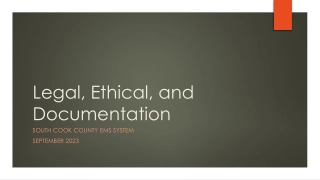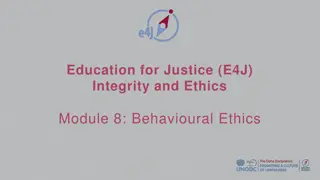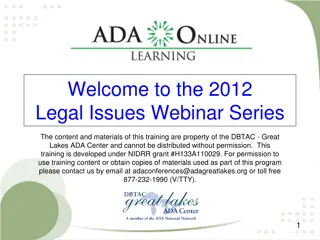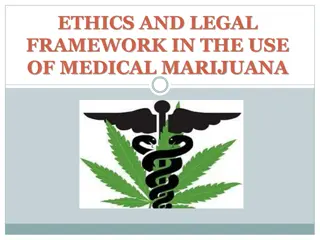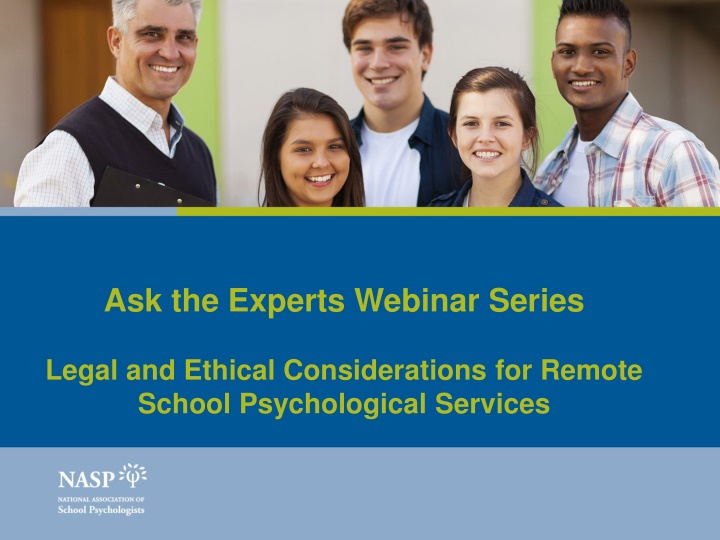
Legal and Ethical Considerations for Remote School Psychological Services Webinar
Explore legal and ethical considerations for remote school psychological services in this informative webinar series. Experts discuss critical questions surrounding virtual telehealth services and offer practical guidance for school psychologists during the COVID-19 pandemic.
Download Presentation

Please find below an Image/Link to download the presentation.
The content on the website is provided AS IS for your information and personal use only. It may not be sold, licensed, or shared on other websites without obtaining consent from the author. If you encounter any issues during the download, it is possible that the publisher has removed the file from their server.
You are allowed to download the files provided on this website for personal or commercial use, subject to the condition that they are used lawfully. All files are the property of their respective owners.
The content on the website is provided AS IS for your information and personal use only. It may not be sold, licensed, or shared on other websites without obtaining consent from the author.
E N D
Presentation Transcript
Ask the Experts Webinar Series Legal and Ethical Considerations for Remote School Psychological Services
Ask the Experts Webinar Series Series of recorded webinars to be posted on the NASP website Webinars are designed to offer support to school psychologists, interns, and practicum students as they navigate the delivery of school psychological services during the COVID-19 pandemic Each webinar will be followed by the opening of a discussion thread on the NASP member exchange community Each webinar will: Address critical questions emerging as a result of the need to provide virtual telehealth school psychological services Provide advice and guidance from experts Offer suggested strategies and resources for addressing professional practice issues
Expert Panel Dan Florell, Ph.D., Associate Professor, Eastern Kentucky University John Garruto, D.Ed. School Psychologist, Oswego School District, NY Melissa Pearrow, Ph.D., Associate Professor, University of Massachusetts Boston 3
Quick Overview of the Legal Issues Federal vs. Local Control in Education USDOE and OCR Guidance is guidance vs. force of law (Zirkel, 2020) Primary Issues Addressed in the Guidance: Protecting the safety and welfare of students, educators, and the community is the top priority Prevent discrimination of students with disabilities (IDEA) including those with the appearance of a disability(504) Protect the confidentiality of student records (FERPA) Maintain informed consent for services Obligation to continue to provide a Free Appropriate Public Education (FAPE) to students with disabilities Overriding Themes: Flexibility, Local Control, FAPE 4
What is a free appropriateeducation? Let s not forget what the Supreme Court said in Endrew F. v DCSD on March 22, 2017: To meet its substantive obligation under the IDEA, a school must offer an IEP reasonably calculated to enable a child to make progress appropriate in light of the child s circumstances. 5
Critical Question 1 What are some of the general ethical issues involved with the remote delivery of school psychological services? 6
NASP Ethical Standards: General Considerations Respect the dignity and rights of all persons Professional competence & responsibility Honesty and integrity in professional relationships Responsibility to schools, families, communities, the profession, and society NASP Principles for Professional Ethics (2010)** https://www.nasponline.org/assets/Documents/Standards%20and%20Certification/Standards/1_%20E thical%20Principles.pdf **The NASP standards are currently being revised. Anticipated completion by May 2020. 7
Critical Question 2 What do our NASP ethical standards say about the delivery of telehealth services? Where the standards don t specifically address an issue, what is a good ethical and legal problem solving model that can be used for making ethical decisions? 8
NASP Ethical Standards 2010 Standards Proposed 2020 Standards 9
Ethical and Legal Decision Making 1. 2. 3. 4. 5. Describe the problem situation. Define the potential ethical legal issues involved. Consult available ethical and legal guidelines. Confer with supervisors and colleagues. Evaluate the rights, responsibilities, and welfare of all affected parties. Consider alternative solutions and the likely consequences of each. Select a course of action and assume responsibility for this decision 6. 7. Reference: Armistead, L., Williams, B. B., & Jacob, S. (2011). Professional ethics for school psychologists: A problem-solving model casebook (2nd ed.). Bethesda, MD: National Association of School Psychologists. 10
Critical Question 3 How should SPs prioritize the student needs and related services that they will deliver? 11
Critical Question 4 What are some of the confidentiality considerations SPs should be thinking about? 12
Critical Question 5 How should consent for services be addressed if SPs are delivering services virtually? 13
Critical Question 6 What type of documentation should SPs be keeping while they are delivering services remotely? 14
Critical Question 7 How should SPs be engaging the parents of students when delivering virtual services? 15
Critical Question 8 What social justice issues are important for school psychologists to consider during the pandemic? 16
Key Messages The US Department of Education and your state departments of education have issued guidance to help you plan your services and supports. Review this guidance and work with your districts special education directors and attorneys to guide your work. The uniqueness of this situation has triggered a need for flexibility. Focus on delivering the most appropriate reliable and valid services that you can given the circumstances. Remote service delivery requires careful attention to the same ethical duties as face to face services Do no harm Be helpful wherever possible Be truthful about what is happening, what is available, and what is still up in the air Maintain records of contacts, services, and supports Protect student confidentiality Follow through, act with fidelity 17
Key Messages, continued If you are asked to provide direct face to face services, consider the risks and benefits balanced against the immediate needs for the services. Be creative. Think about how services can be adapted and tailored to the student s new environment. Use your frames and models for legal and ethical problem solving. Family engagement and consent is critical. Where any modification is occurring, make sure parents are aware and consent to the modifications. Consider limitations that students might have to accessing services (no internet, no computer, etc.) and strategize about how access can be improved. 18
NASP Resources NASP Principles for Professional Ethics (2010) https://www.nasponline.org/assets/Documents/Standards%20and%20Certification/Standards/1_%20Ethi cal%20Principles.pdf NASP Health Crisis Resources https://www.nasponline.org/resources-and-publications/resources-and-podcasts/school-climate-safety- and-crisis/health-crisis-resources NASP Virtual Service Delivery in Response to COVID-19 Disruptions https://www.nasponline.org/resources-and-publications/resources-and-podcasts/school-climate-safety- and-crisis/health-crisis-resources/virtual-service-delivery-in-response-to-covid-19-disruptions NASP Guidance for the Delivery of School Psychological Telehealth Services http://www.nasponline.org/assets/documents/Guidance_Telehealth_Virtual_Service_%20Delivery_Final %20(2).pdf Just a Click Away: Virtual School Psychologist for Hire https://www.nasponline.org/publications/periodicals/communique/issues/volume-46-issue-1/just-a-click- away-virtual-school-psychologist-for-hire 19
External Resources Perry Zirkel, Special Supplement: COVID-19 and K-12 Students with Disabilities: Initial Guidance https://perryzirkel.com/2020/03/20/special-supplement-covid-19-and-k-12-students-with-disabilities- initial-guidance/ US Department of Education COVID-19 Information and Resources for Schools and School Personnel. https://www.ed.gov/coronavirus US Department of Education, Office of Civil Rights: FACT SHEET: Addressing the Risk of COVID-19 in Schools While Protecting the Civil Rights of Students https://www2.ed.gov/about/offices/list/ocr/docs/ocr-coronavirus-fact-sheet.pdf US Department of Education: FERPA and Virtual Learning https://studentprivacy.ed.gov/resources/ferpa-and-virtual-learning US Department of Health and Human Services: Notice of Enforcement Discretion for Telehealth Remote Communications During COVID-19 Public Health Emergency https://www.hhs.gov/hipaa/for-professionals/special-topics/emergency-preparedness/notification- enforcement-discretion-telehealth/index.html 20

